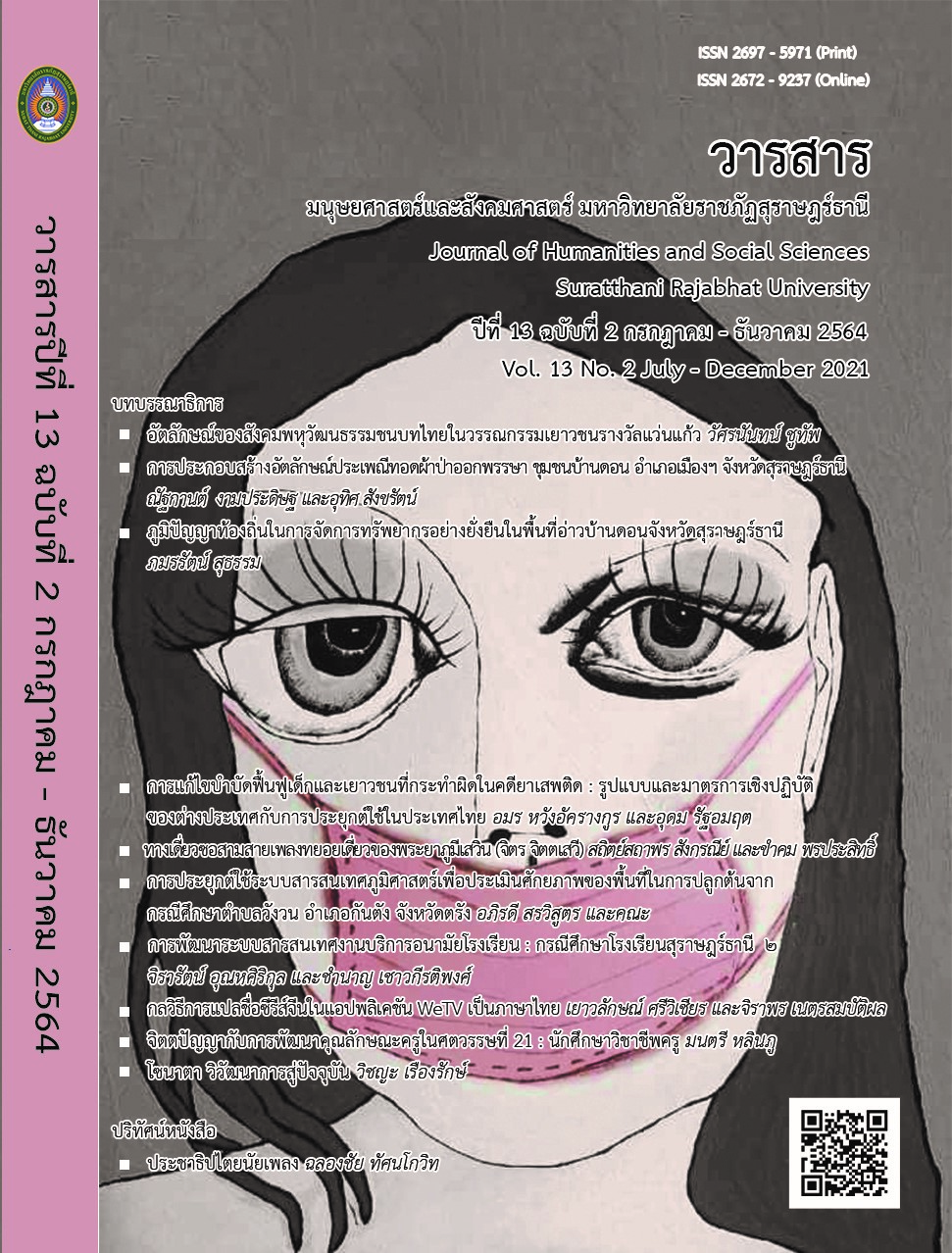The Contemplation for Developing the Teacher Characteristics in the 21st Century: The Pre-Service Teachers
Main Article Content
Abstract
Contemplation is the intuition based on the well-trained mind through pondering with the consciousness leading to the awakening of all thing values, see the solidarity connectedness among oneself, others,society, and environment which causes the inner tender within the self and leads to docile, respect and honour each humanness with the integration of loving-kindness towards mankind and entire beings as well as havingconfidence in self-potential to dismantling the subconsciousness of smug and selfish which is the root of self-attachment in order to expand the awareness dimension in living together that consider the public benefits as a target and be ready to act the creative changes to the organization, the society, and the world. Contemplative Learning is the alarm of awakening of attributes within humans leading to insight intuition in order to revolutionize from smug to generous with the loving-kind and supportive mind.
Article Details

This work is licensed under a Creative Commons Attribution-NonCommercial-NoDerivatives 4.0 International License.
All published manuscripts have been verified by peer-peer professors in the fields of humanities and social sciences. Reprinting of the article must be authorized by the editorial staff.
References
จักรกฤษณ์ จันทะคุณ. (2560). ผลการจัดกิจกรรมการเรียนรู้ตามแนวจิตตปัญญาศึกษาที่
ส่งผลต่อความสามารถในการพัฒนาหลักสูตรท้องถิ่นของนิสิตครู มหาวิทยาลัย
พะเยา. Journal of Community Development Research (Humanities
and Social Sciences). 10(4), 93-94.
ธนา นิลชัยโกวิทย์, และอดิศร จันทรสุข. (2559). ศิลปะการจัดกระบวนการเรียนรู้เพื่อ
การเปลี่ยนแปลง : คู่มือกระบวนกรจิตตปัญญา (พิมพ์ครั้งที่ 2). กรุงเทพฯ:
ภูสายแดด.
ประเวศ วะสี. (2550). มนุษย์กับการเข้าถึงความจริงสูงสุด ความจริง ความดี ความงาม.
กรุงเทพฯ: สถาบันพัฒนาและรับรองคุณภาพโรงพยาบาล.
ประเวศ วะสี. (2557). อภิวัฒน์การเรียนรู้สู่จุดเปลี่ยนประเทศไทย. กรุงเทพฯ: มาตา.
มนตรี หลินภู. (2562). ครูกับการแนะแนวในศตวรรษที่ 21. วารสารบัณฑิตแสงโคมคำ
มหาวิทยาลัยมหาจุฬาลงกรณราชวิทยาลัย วิทยาเขตพะเยา. 3(2), 191.
สลักจิต ตรีรณโอภาส. (2563). จิตตปัญญากับการจัดการเรียนรู้. [ออนไลน์]. เข้าถึงได้
จาก http://edu.psru.ac.th/2011/pdf/Jitta.pdf [2563, พฤษภาคม 7].
สมหมาย ปวะบุตร. (2558). เอกสารประกอบการสอน ชุดวิชาการพัฒนาความเป็นครู
วิชาชีพ. กรุงเทพฯ: คณะครุศาสตร์มหาวิทยาลัยราชภัฏสวนสุนันทา.
ศิรประภา พฤทธิกุล. (2553). จิตตปัญญาศึกษา. วารสารศึกษาศาสตร์ 22(1), 4.
วันทนีย์ นามสวัสดิ์. (2557). ผลการใช้จิตตปัญญาศึกษาเพื่อเสริมสร้างคุณลักษณะความ
เป็นครูสำหรับนักศึกษาครุศาสตร์ มหาวิทยาลัยราชภัฏ. วารสารวิชาการ
มหาวิทยาลัยราชภัฎศรีสะเกษ. 8(1), 9.
วิจักขณ์ พานิช. (2548). จิตผลิบานอ่อนโยนต่อชีวิต อ่อนน้อมต่อธรรมชาติ การเรียนรู้
ด้วยใจอย่างใคร่ครวญ. กรุงเทพฯ: อัมรินทร์.
Ariyabhorn Kuroda. (2014). Contemplative Education Approaches to
Teaching Teacher Preparation Program. Procedia Social and
Behaviour Sciences, Published by Elsevier Ltd, [Online]. Retrieved
from http://sciencedirect.com. [2020, October 7].
Maria Impedovo, and Sufiana Khatoon Malik. (2016). Contemplative
Practice for Teacher Students : Should It Be Included in Teaching
Training Curriculum. [Online]. Retrieved from https:// researchgate.
net/publication/312580352_Contemplative_Practice_for_Teacher_
Students_Should_It_Be_Included_in_Teaching_Training_Curriculum.
, October 9].
Shani Singh. (2017). Contemplative Pedagogy and Practices In Higher
Education : A Tool for Transformative Learning, Youth Development
and Social Change. International Education & Research Journal.
(5), 322.


